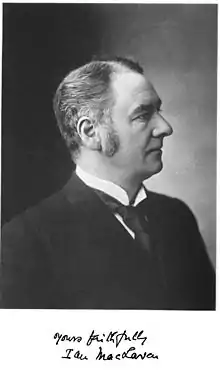Ian Maclaren
Rev Dr John Watson DD (3 November 1850 – 6 May 1907), was a minister of the Free Church of Scotland. He is remembered as an author of fiction, known by his pen name Ian Maclaren.
Ian Maclaren | |
|---|---|
 | |
| Born | John Watson 3 November 1850 Manningtree, Essex, England |
| Died | 6 May 1907 (aged 56) Mount Pleasant, Iowa, US |
| Nationality | British |
Life
The son of John Watson, a civil servant, he was born in Manningtree, Essex, and educated at Stirling. His paternal uncle Rev Hiram Watson (1813-1891) was a minister of the Free Church of Scotland and John appears to have chosen to follow in his shoes.[1]
He studied at Edinburgh University, then trained as a Free Church minister at New College in Edinburgh, also undertaking some postgraduate study at Tübingen.
In 1874 he was licensed by the Free Church of Scotland and became assistant minister of Edinburgh Barclay Church. In 1875 he was ordained as minister at Logiealmond in Perthshire. In 1877 he was transferred to St Matthews Free Church in Glasgow. In Glasgow he lived at 44 Windsor Terrace.[2] In 1880 he became minister of Sefton Park Presbyterian Church in Liverpool, from which he retired in 1905. During this period he was a main mover in the founding of the Westminster College in Cambridge.[1]
In 1896 he was Lyman Beecher lecturer at Yale University, and in 1900 he was moderator of the synod of the English Presbyterian Church. While travelling in the United States he died from blood poisoning, following a bout with tonsilitis,[3] at Mount Pleasant, Iowa. His body was returned to England, and buried in Smithdown Cemetery in Liverpool.[4]
Maclaren's first stories of rural Scottish life, Beside the Bonnie Brier Bush (1894), achieved extraordinary popularity,[5] selling more than 700,000 copies,[6] and was succeeded by other successful books, The Days of Auld Lang Syne (1895), Kate Carnegie and those Ministers (1896), and Afterwards and other Stories (1898). By his own name Watson published several volumes of sermons, among them being The Upper Room (1895), The Mind of the Master (1896) and The Potter's Wheel (1897). Today he is regarded as one of the principal writers of the Kailyard school.[7]
It is thought that Maclaren was the original source of the quotation “Be kind, for everyone you meet is fighting a hard battle,” now widely misattributed to Plato or Philo of Alexandria. The oldest known instance of this quotation is in the 1897 Christmas edition of The British Weekly, penned by Maclaren: “Be pitiful, for every man is fighting a hard battle.”[8]
The highly impressive St Matthews Free Church became the Highland Memorial Church in 1941 and was destroyed by fire in 1952.[9]
Family
In 1878 he married Jane B Ferguson.
Bibliography

Fiction as Ian Maclaren
- 1894: Beside the Bonnie Brier Bush
- 1895: The Days of Auld Lang Syne
- 1895: A Doctor of the Old School
- 1896: Kate Carnegie and those Ministers
- 1898: Afterwards and other Stories
- 1898: Rabbi Saunderson
- 1899: Young Barbarians
- 1907: Graham of Claverhouse (novel)
Non-fiction as Ian Maclaren
- 1896: The Cure of Souls
- 1898: Companions of the Sorrowful Way
- 1900: Church Folks
- 1912: Books and Bookmen (book)
- 1899: ‘’The Light of the World or The Bible illuminated and Explained.
Books of sermons as John Watson
- 1895: The Upper Room (book)
- 1896: The Mind of the Master
- 1897: The Potter's Wheel
- 1898: Companions of the Sorrowful Way
- 1899: In Answer to Prayer: The Touch of the Unseen - A book of sermons cowritten with Rev. W. Boyd Carpenter (Lord Bishop of Ripon 11), Rev. Theodore L. Cuyler, Rev. Canon Knox Little, William Quarrier, Leonard K. Shaw, Rev. R. F. Horton, Rev. H. Price Hughes, Rev. J. Clifford, G. D. Boyle (Dean of Salisbury)
References
- Ewing, William Annals of the Free Church
- Glasgow Post Office Directory 1879
- Papers Past - Nelson Evening Mail, Volume XLII, 8 May 1907, Page 4
- Nicoll, W. Robertson (1908). ‘Ian Maclaren’: Life of the Rev. John Watson, D.D. London: Hodder and Stoughton. p. 379.
- "Ian Maclaren's Beside the Bonnie Brier Bush is one of the most notorious works of Scottish literature. First published in 1894, the book was an instant best-seller. Millions of readers across the world rushed to devour these nostalgic tales of Scottish life in a bygone age". Kennedy & Boyd. Retrieved 13 October 2009.
- "Kailyard School (1886-1896)". The Literary Encyclopedia. Retrieved 13 October 2009.
- Campbell, Ian (1981), Kailyard: A New Assessment, The Ramsay Head Press, Edinburgh
- "Be Kind; Everyone You Meet is Fighting a Hard Battle – Quote Investigator".
- "TheGlasgowStory: St Matthew's Highlanders' Memorial Church". www.theglasgowstory.com.
 This article incorporates text from a publication now in the public domain: Chisholm, Hugh, ed. (1911). "Maclaren, Ian". Encyclopædia Britannica. 17 (11th ed.). Cambridge University Press. p. 261.
This article incorporates text from a publication now in the public domain: Chisholm, Hugh, ed. (1911). "Maclaren, Ian". Encyclopædia Britannica. 17 (11th ed.). Cambridge University Press. p. 261.
External links
| Wikiquote has quotations related to: Ian Maclaren |
![]() Media related to Ian Maclaren at Wikimedia Commons
Media related to Ian Maclaren at Wikimedia Commons
- Works by Ian Maclaren at Project Gutenberg
- Works by or about Ian Maclaren at Internet Archive
- Works by or about John Watson at Internet Archive
- Ian Maclaren at Library of Congress Authorities, with 27 catalogue records